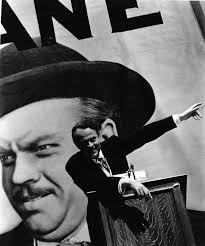'The Evolution of the Language of Cinema' Written when the artistic prestige of Hollywood had reached an all time low

- rejected the typical antithesis of silent vs sound cinema
- Thought there were 'directors who believe in image and those who believe in reality'
- former favoured montage to allow them to impose an interpretation of the events they portrayed
- Eisenstein, Hitchcock, Griffith
- the other would use long takes that preserved as far as possible the unity of time and space to disengage the 'deep structures' of reality and to bring out 'pre existing relations'
- Welles, von Stronheim, Jean Renoir
- in his opinion film should be evaluated 'according not to what it adds to reality but what it reveals of it'
- Called for aesthetic that would preserve the continuity of experience
- Condemned trick effects such as expressionistic devices and low angle shots
- image should ideally produce an objective record of reality rather than the illusion of realism by means of a network of signs
- need to enlist artifice to give the illusion of transparency generated a creative tension that was crucial
- true mimesis would result in flat and unheightened naturalism
- 'Realism in art can only be achieved only in one way -artifice'
- ideally wanted cinematographic image to be an objective record
- 'there is not one but several realisms'
Significance:
- Broke out of the dogma that film had gone into irremediable decline
- realism not as a symptom of degenracy but as a medium of expression which one could achieve artistic excellence
- influence on Metz
Anti-Bazin Position:
- related to the philosophy of Personalism
- His criterion of reality was of harmony and unitary - based as much on ideological premises as those that pictured the world as discordant and contradictory that he rejected
- Bazin denying that film is a culturally determined language system
- Saw Relationship between signified and signifier was intimate and existential not arbitrary
- analogies between death masks or fingerprints with photography
- naively optimistic in thinking that cinema was evolving towards perfection
- Contradiction in his ideas that he stressed the actuality rather than the ideal
- inability to resolve the contradiction between film as a record of reality and as a producer of meaning

No comments:
Post a Comment